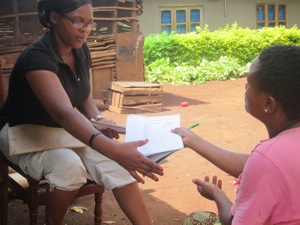Before working at Jipe Moyo, I had no experience with people living with HIV/AIDS. I had heard about it, read about it in the newspaper, and seen reports on television, but I have never seen it for myself.
When I started at Jipe Moyo, what I saw was almost indescribable. As part of my work, I visited the homes of the Jipe Moyo members where I began to see and learn for myself. I saw that getting the HIV diagnosis changed everything. For many people, when they found out they had HIV, they got fired. If they were married, their husbands left them. They became isolated by their parents and family. I saw that some of them disvalue their own life because they think having HIV/AIDS is the end of living and they have become completely alone.
Many of our members lack adequate food and shelter. Most of them are women and children. The children often lack education because their parents have no source of income so they cannot pay the school fees to educate their children. I saw that there is much discrimination from people around them because the community does not have knowledge about HIV/AIDS and many people think that if they interact or live closely with people who have HIV, they will be infected too. People think that all those infected with HIV are sinners. Because of discrimination, HIV patients get no help from family, neighbors, or other members of the community.
Getting to know HIV patients and seeing how they live, I have learned other things also. I have learned that having HIV/AIDS is not the end of life. You may be infected but you can still have a long and happy life just like other people if you take medication and follow the doctor’s advice. I have learned that not all people with HIV/AIDS are prostitutes or sinners. They are mothers and fathers and children and people who did nothing wrong.
Because of what I have seen with my own eyes, I have been inspired to help them, to make them feel that they are human beings just like everyone else and have equal rights. I am inspired to give them strength to live so they can see that life is full of happiness. I want them to feel that they are a part of society and can cooperate with others and make decisions equally with other people even though they are infected.
I am also inspired to help them find donors and funds to educate their children and get basic needs. I am also finding ways to educate society as a whole about HIV, that being HIV positive is not the end of life, and how to care for people who are HIV positive.
I face many challenges in my work at Jipe Moyo. But I also love it because I am learning how to help my fellow Tanzanians feel like full members of society. Learning first hand about the problems they face, I am learning how best to help them. I will be able to use everything I am learning to be an ambassador for Tanzanians with HIV and educate our whole society so that we all have more knowledge.
Nuru Wilfred is an Africa Volunteer Corps volunteer working for the year at Jipe Moyo, a community based organization in Uru, outside of Moshi, Tanzania that provides support for HIV positive people in Uru. “Jipe Moyo” translates as “Give Hope.” (Translated with help from Caitlin Kelley)

